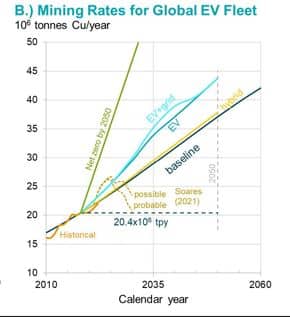Copper is the most essential mineral for the global energy transition. It’s needed at every step from generation to transmission to storage. Yet for the scale of transition underway, there is no yet anywhere near enough in production to meet demand.
That’s according to a report sponsored by the International Energy Forum. Its members are 72 energy ministers from different nations including Australia.
For the transition to continue at its current rate for the next 30 years, humankind will have to more than double the amount of cupper that has been mined throughout all of history. To convert all petrol-powered vehicles to electric vehicles (EVs), copper production would need to reach 55% higher than that.

Each electric vehicle currently requires 60 to 80 kg of copper in manufacture. While innovation from auto-makers may see that number trend downwards, it’s still a huge amount given the policy plans for EVs.
In the EU, all new cars made from 2035 will have to be electric only. In the US, California has done the same and, in Australia, so has the ACT.
The problem is also the slow speed in developing large-scale copper mining operations. Of all the copper mines that started producing over the past five years, their average time from discovery of an ore deposit to starting production was 23 years.
And while there have been over 200 new copper deposits discovered since 1990, just 16 have been discovered over the past 10 years.
In addition, the mining industry is reporting skills shortage and rising labour costs. Vacancy rates in mining jobs in Australia are now over 5% and there has been a 63% drop in mining engineering enrolment compared with 2014.
Mining has become increasingly unpopular, a flashpoint for critiques of economic development and environmental damage. Yet it is indispensable for an energy transition that, while it will prove far more efficient than the previous system, will still be tremendously resource intensive to put in place.
Sign Up To Our Free Newsletter